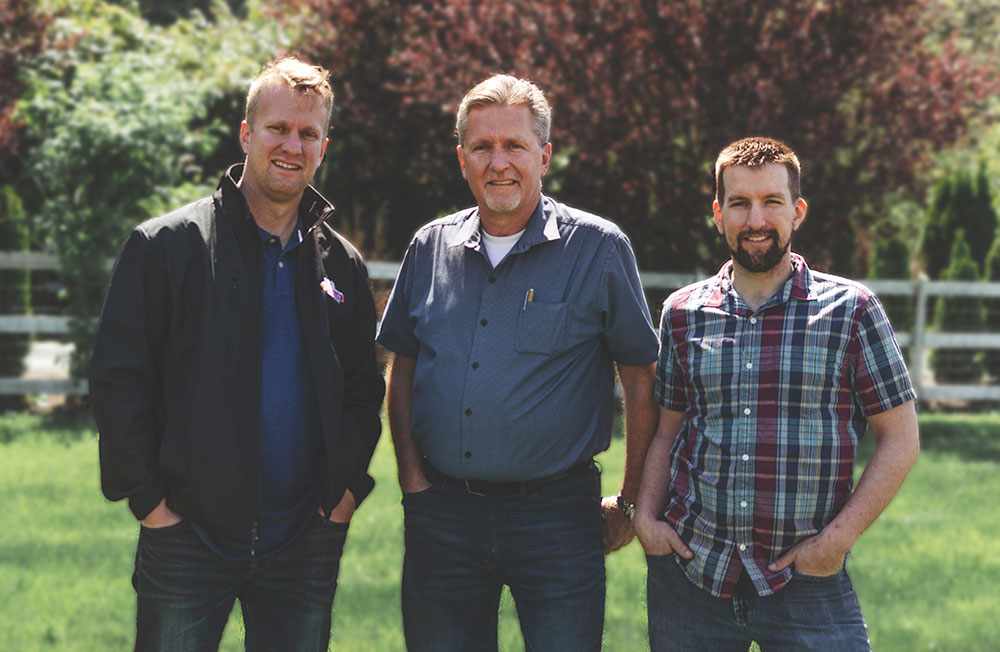
From the Editor: Cut red tape to unleash innovation
Brett Ruffell
Features Farm BusinessA poultry producer’s costly legal battle underscores an issue – Canadian farmers are being held back by red tape.
 From left to right: Joe Falk, general manager; Ken Falk, president; and Josh Falk, maintenance manager.
From left to right: Joe Falk, general manager; Ken Falk, president; and Josh Falk, maintenance manager. During the time we were searching for producers who’ve diversified their businesses in interesting ways to feature in last year’s Who’s Who issue, numerous people told us about Fraser Valley Specialty Poultry (FVP). Profiling these innovators was a no-brainer. Led by president Ken Falk, its offerings are amongst the most diverse I’ve seen. FVSP’s product line ranges from French-heritage duck and local squab, to free-run goose and organic chicken prepared in different ways. It also uses innovative sales and distribution avenues.
More recently, FSVP made headlines for a different reason. It was the victim of a costly struggle with red tape. The poultry producer was fined $42,000 by the Canadian Food Inspection Agency (CFIA) because its customers purchased product in B.C. and then sent it to Alberta.
Falk was penalized despite the fact that there’s no rule saying a business has to track its product beyond its immediate customer. With FVSP filling numerous orders to buyers across B.C., tracking what they then do with their product is impractical.
A tribunal agreed, exonerating Falk. However, the legal battle cost him $130,000 – not to mention the personal stress it caused Falk and his family. “On the one hand I am happy to be exonerated of this wrongful charge,” Falk says. “On the other, I am very angry that a government agency can do this and have little or no apparent consequence.”
The situation earned CFIA a Paperweight Award from the Canadian Federation of Independent Business (CFIB), an association for business owners like Falk.
The award highlights what CFIB deems to be the worst instances of excessive regulations. “This is a real-life example of how interactions with government agencies can weigh down an agri-business owner and drown them in red tape, taking up time, money and resources that could be better spent growing and expanding their business or contributing to their community,” explains Virginia Labbie, CFIB’s senior policy analyst for agri-business.
The vast majority of farmers share Falk’s frustration with red tape, according to new CFIB research. A survey reveals 95 per cent of farmers agree reducing things like paper burden and over-regulation for small businesses would help Canada become more competitive.
The association has been communicating these frustrations to agriculture ministers across the country. CFIB’s also been advocating for other changes that it feels would help make poultry farmers more competitive.
The first matter is around the federal carbon tax. Currently, the Federal Carbon Pollution Pricing System includes a carbon tax on propane or natural gas used to heat poultry facilities. CFIB wants farmers to be exempt from the carbon tax for propane and natural gas used to dry grain or heat dairy or poultry facilities.
The association’s second concern relates to the intergenerational farm transfer. The current federal Income Tax Act makes it harder for farmers and small businesses to transfer or sell their business to a family member.
Forty-one per cent of CFIB’s farm members plan on exiting their business within the next 10 years. Of those, 62 per cent plan to sell or transfer their business to a family member. CFIB believes this is an issue that needs attention to ensure the next generation of farmers are able to take over the family farm business.
While producers face a few barriers to competitiveness, there’s still groundbreaking work happening in the Canadian poultry industry. In the pages ahead, we highlight examples of farmers staying on the forefront of innovation, researchers exploring new avenues and more.
Print this page